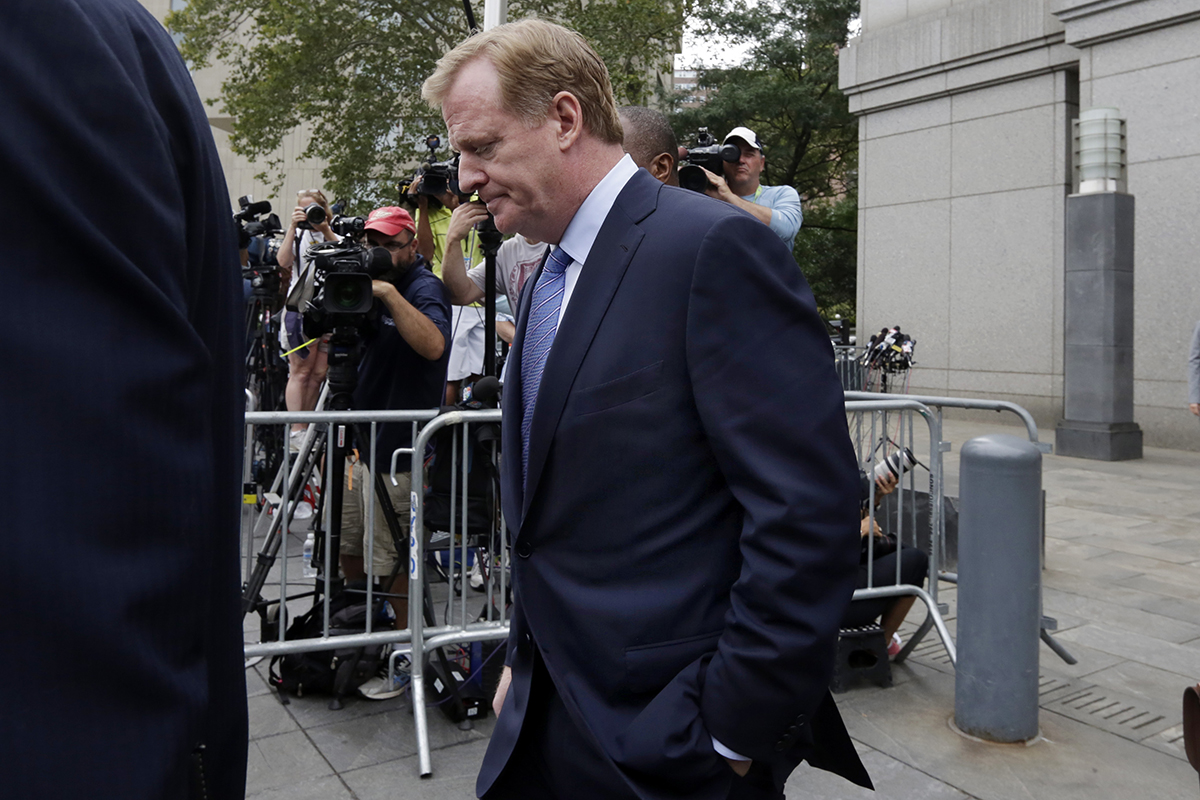The Deflategate Appeal Hearing Isn’t About Tom Brady or Deflated Footballs

Photo via AP
When three federal appellate court judges listen to oral arguments in the Deflategate appeal hearing in a Manhattan courtroom Thursday, they won’t be concerned with whether Tom Brady deflated footballs prior to last year’s AFC Championship. In fact, Brady isn’t even expected to be in attendance.
The only issue at play is whether Judge Richard Berman, who vacated Brady’s four-game suspension last September, overstepped his bounds. The NFL says he did, whereas the Players’ Association maintains Roger Goodell’s decision needed to be overturned because his arbitration hearing lacked due process and was rife with procedural errors.
“The appellate court is very unlikely to look at the facts,” says Vern Inge, a sports law attorney for the national law firm LeClair Ryan. “It would have to find something outrageous to change the facts or findings of the court. The appellate court doesn’t get to hear the witnesses and decide who’s believable or not. These are just legal arguments.”
Each side will be allotted roughly 15 minutes to state its case to the justices, who could then take several months to render a verdict. There’s a possibility they won’t reach a decision until the summer, when the Patriots will already be beginning preparations for the 2016 season.
Much like in September’s hearing, the NFL’s attorneys will argue Article 46 of the collective bargaining agreement gives Goodell absolute disciplinary power. The provision says Goodell can fine or suspend any player who engages in “conduct detrimental to the integrity of, or public confidence in, the game of professional football.” It’s up to Goodell’s “reasonable judgment” to assess and define what that means.
According to the NFL, it doesn’t matter how many flaws exist in Ted Wells’ report. Goodell doesn’t have to be right in order for his decision to be upheld. He just needs to satisfy the low bar of “reasonable judgment,” which the NFL says he did based on the Wells Report’s findings and Brady’s arbitration hearing.
The NFLPA, meanwhile, will argue Goodell treated Brady so unfairly that his arbitration award had to be overturned. When Judge Berman vacated Goodell’s suspension, he cited three legal failings in the NFL’s case:
- The NFL didn’t provide Brady adequate notice of his previous penalties.
- The NFL didn’t make its general counsel who edited the Wells Report, Jeff Pash, available at the hearing. That’s akin to withholding a witness.
- The NFL didn’t share Pash’s notes with the NFLPA, which means it withheld evidence as well.
“The deference to an arbitrator does not extend so far as to require a district court to countenance, much less confirm, an award obtained without the requisites of fairness or due process,” Berman wrote in his 40-page decision.
The NFLPA’s representatives maintain Goodell violated the “law of shop,” which says an arbitrator must supply a fair notice of punishments. Goodell, whose Bountygate suspensions were rescinded for this exact reason, ignored CBA policy that authorizes fines for football tampering and uncooperative behavior during an investigation.
The outcome of the case is almost entirely dependent on how each justice interprets the law. Two of the judges who will hear the case, Robert Katzmann and Denny Chin, were appointed by Democratic presidents (President Clinton appointed Katzmann and President Obama appointed Chin), and Justice Barrington Parker Jr. was appointed by President George W. Bush. Conventional wisdom leads one to believe the two Democratic appointees have a predisposition to side with labor, but Inge says that isn’t always true.
“Just because judges are appointed by a Democrat or Republican doesn’t mean they have a jurisprudence philosophy that’s conservative or liberal,” Inge says. “Remember, it’s a lifetime appointment. Their view of the world changes as they mature and spend time on the bench. It’s hard to predict that just because they were appointed by a Democrat or Republican they may rule in a certain way.”
One number that appears to be good news for Brady is that appellate courts only reverse Judge Berman’s decisions eight percent of the time. These particular justices have overturned his rulings on 12 percent of proceedings.
But Inge says those numbers don’t necessarily indicate how this case will be decided. “Every case is different,” Inge says. “This one is more high-profile, so you get closer attention, which means you could throw out the statistics on this.”
The possibility also remains that the three justices could call for yet another hearing in front of Judge Berman. This could happen if the panel believes he misapplied the law, but also needs to hear more oral arguments before he can issue another decision. Michael McCann of Sports Illustrated points out the losing side could also eventually try to call for a hearing in front of—you guessed it—the Supreme Court.
After 14 months and nearly $20 million in legal fees, the Deflategate saga is still far from over.


